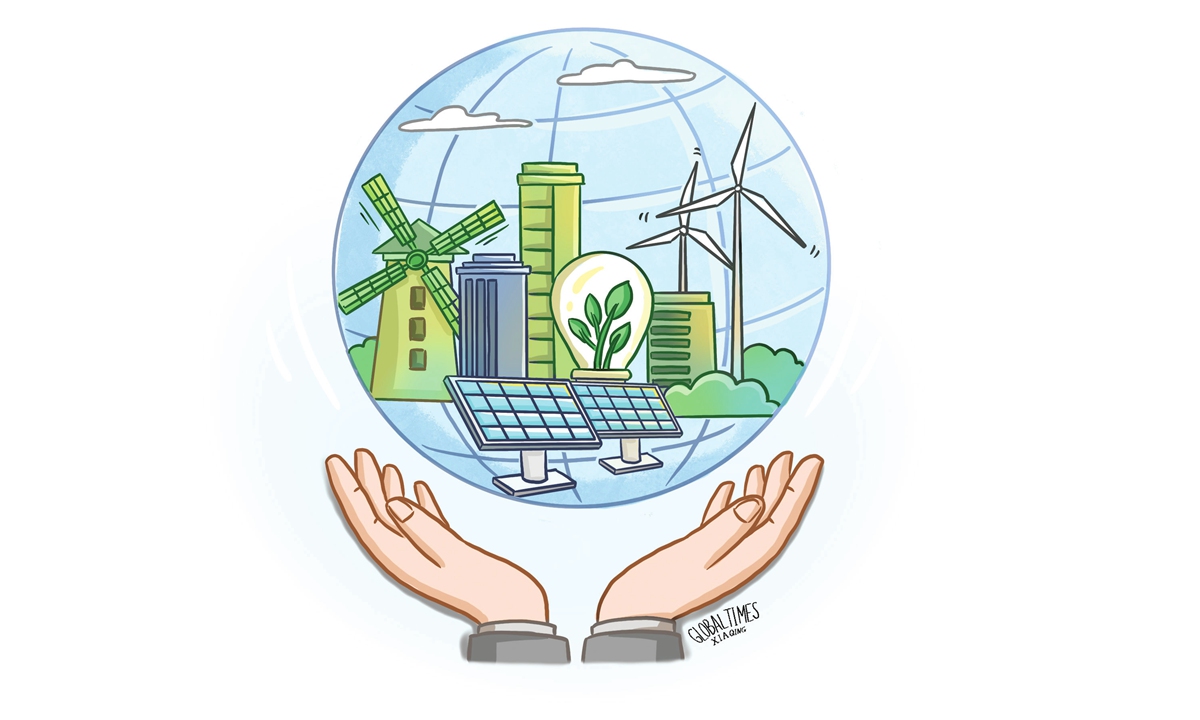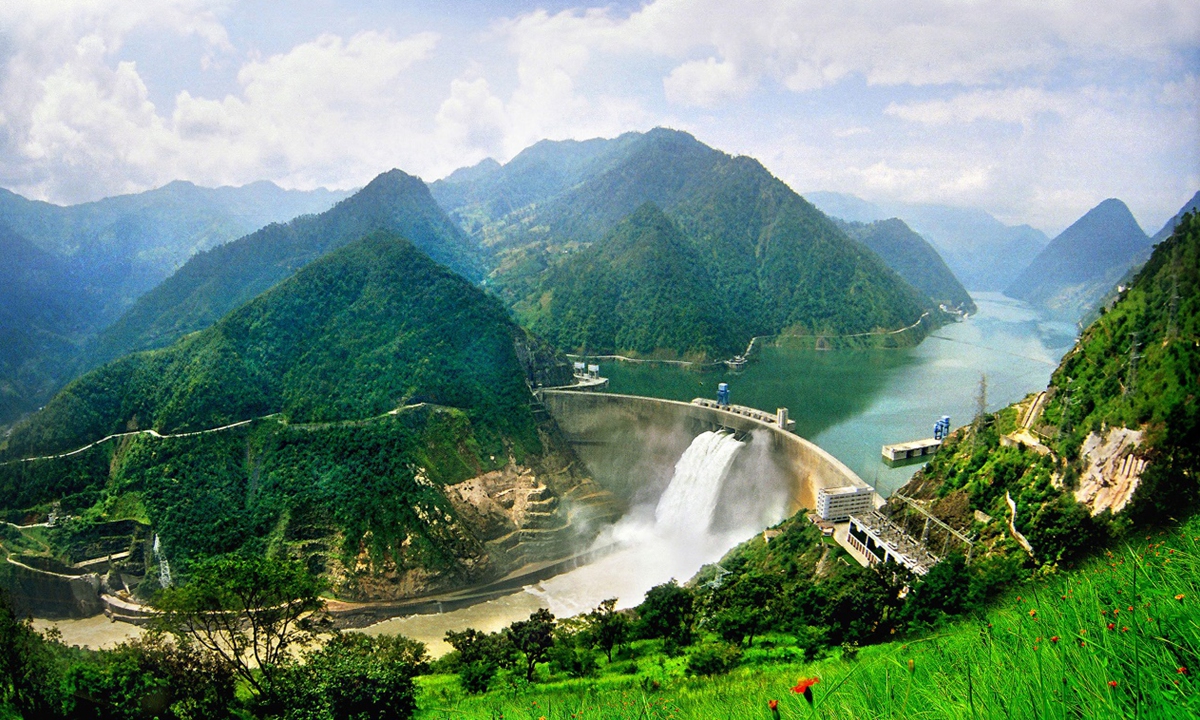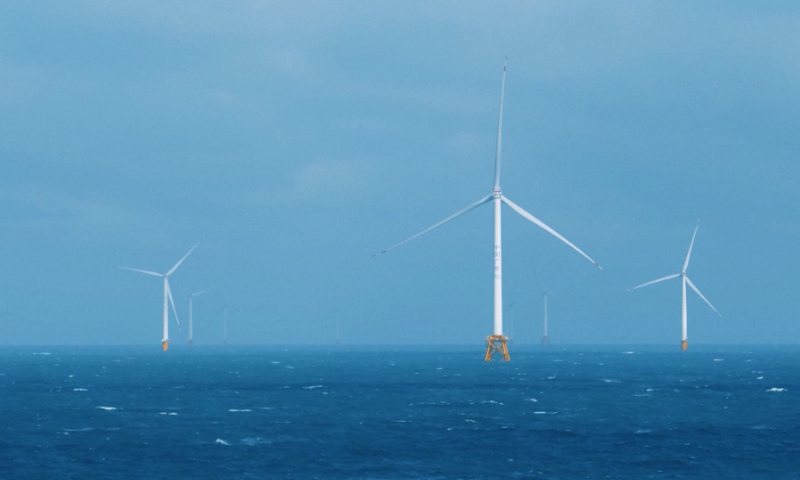
Illustration: Xia Qing/GT
There are high complementarities between the EU and China since both sides are impacted by climate change and both have clear targets to pursue in the green transition, Vicky Pollard, head of the Unit in the European Commission's Directorate General for Climate Action, told the Global Times in an exclusive interview on Thursday.
Chinese experts said that the remarks set a rare and positive tone from the EU side in seeking more cooperation with China against the backdrop of the intensified probe targeting Chinese new-energy products.
They also said that in order to facilitate their green transition, the EU needs to put more words into action by looking at cooperation rather than competition with China in the field.
The EU and China have much more to cooperate on in the green economy, said Pollard, noting that it also makes economic sense for the EU and China to cooperate for the green transition.
The remarks were made after a meeting on EU 2040 Climate Target, a seminar co-hosted by the EU Delegation to China and the Institute of Climate Change and Sustainable Development of Tsinghua University in Beijing on Thursday.
During the meeting, Pollard gave a thorough presentation on EU's 2040 climate target and Chinese experts and industry representatives exchanged their views on how to pursue green transition and how China and the EU can cooperate in achieving their respective targets for carbon reduction.
Talking about the cooperation that have been made between China and the EU in green transition, Pollard told the Global Times that there are many things both EU and China have discussed and have been working on, including emission trading.
"We also share experiences and seek cooperation on our respective domestic frameworks to ensure deployment of innovative solutions to ensure we meet our commitment to tackle climate change, and we make sure that those commitments are achieved in the most cost-effective ways," Pollard said.
While climate change is a global problem, Pollard said that "by acting together, we can do so at a lower cost and faster provided there is a level playing field. It's also about more dialogue and learning from each other to develop good policies."
The deployment of renewables such as wind power and solar power in the EU and in China is a good example of good policies and the benefits of deployment at scale, said the EU official.
"The EU cannot undergo the green transition alone, nor can China. It's important that we work together within a rule-based system, including for trade, and maintain balance," Pollard further noted.
Laurent Bardon, head of the Green Transition Section at the Delegation of the European Union to China, told the Global Times that from Thursday's meeting, it's evident that participants from both sides engaged in an open discussion, striving to find optimal solutions for enhancing cooperation between China and the EU in the green transition.
"It's good more interactions like this take place in the future," Bardon said.
The China-EU economic and trade ties have encountered rising concerns after the EU issued on March 6 the Official Journal of the European Union regarding its commission's implementation regulation that makes imports of new battery electric vehicles designed for the transport of persons originating in China subject to registration.
The mandate may have some impact on EV exports to Europe, as it may possibly be followed by punitive tariffs, as experts and media reports had said.
Responding to the media question regarding customs registration, He Yadong, a spokesperson of China's Ministry of Commerce, said that the EU's import registration measures and possible retroactive taxation have increased the number of import links and added burdens to normal trade.
It is not conducive to deepening cooperation in the new-energy industries of both parties and will also affect the interests of EU consumers, He noted.
Although the EU claims to seek cooperation with China in green transformation, in reality, there is still significant suppression, Lin Boqiang, director of the China Center for Energy Economics Research at Xiamen University, told the Global Times on Thursday. He noted that the EU's move targeting corresponding Chinese products is mainly due to geopolitical factors and a desire not to overly rely on China's industrial chain.
"Green transformation mainly involves cost-effective control and the application and popularization of green technology, and China, with its mature industrial chain, has a good advantage in this regard that the EU cannot imitate in the short term," Lin said.
However, if the EU side truly wishes to facilitate green transformation cost-effectively, it should refrain from suppressing relevant Chinese enterprises and products, Lin remarked.
Green transformation is a common goal for China and the EU. The EU needs China's affordable green products, while China needs the EU's large market, which is a win-win situation for both sides, Lin said.


